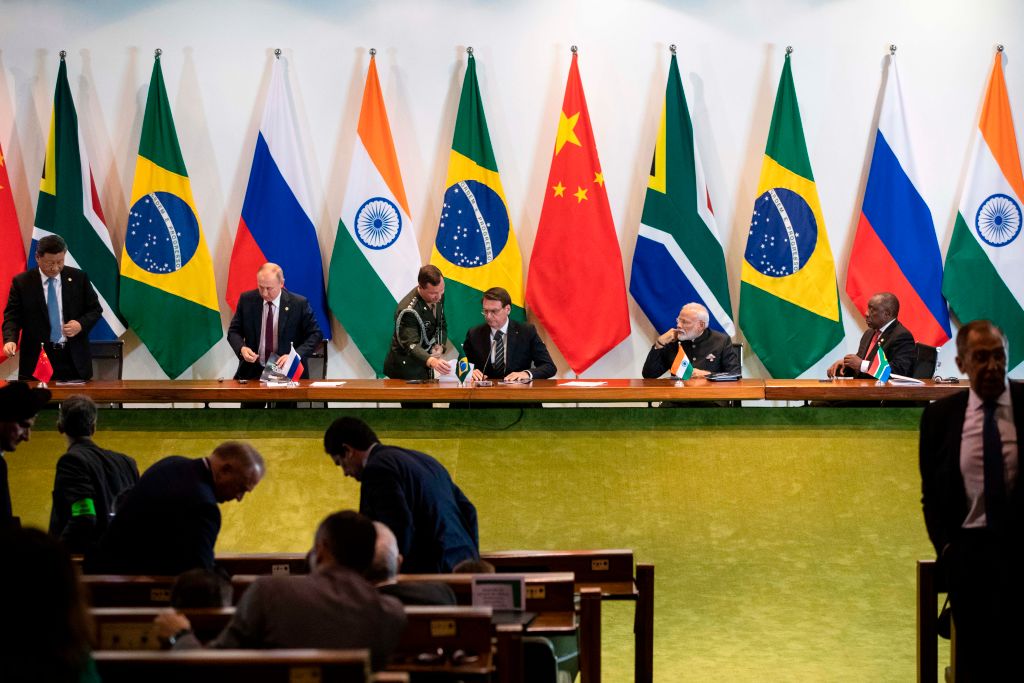- Monday, May 05, 2025

By: Shubham Ghosh
IT is considered by many as a bloc that could give leadership over an alternative world order. With five of the world’s significant economies and two most populous nations as its members, the BRICS (Brazil, Russia, India, China, South Africa) is often seen by many as the grouping for the future.
However, India’s former diplomat TP Sreenivasan is not too optimistic about the future of BRICS.
ALSO READ: One BRICS member blocked its participation in Beijing summit, says Pakistan
In an opinion piece he penned for Khaleej Times, Sreenivasan said the original idea behind the formation of BRICS was not to see it as a formal grouping but China welcomed the idea of the bloc becoming the nucleus of a new economic grouping after sensing the possibility of developing a non-western global economic system.
Iran, Argentina in queue to join BRICS: Russian media report
“BRICS (Brazil, Russia, India, China and South Africa) which held a virtual a summit meeting under the Chairmanship of China in June was the brain-child of a Goldman Sachs economist, who wanted to categorise Brazil, Russia, India and China, which were expected to collectively dominate global growth by 2050. It was not intended to be a formal grouping at all. But seeing the possibility of developing a non-Western global economic system, China welcomed the idea of BRICS as the nucleus of a new economic grouping and invested energy and resources in building it. The others, joined later by South Africa were also attracted by the idea of creating a catalyst to form an alternative to the Bretton Woods institutions. India was not enthusiastic about it because it was feared that it would be seen as a counter to the existing global system,” the former diplomat said.
Sreenivisan said the composition of BRICS had its own contradictions right from the beginning. In his words, “Two permanent members of the Security Council, together with three aspirants to permanent membership appeared like two carnivores and three herbivores invited to the same meal with little possibility of a change in the menu.”
He said the fundamental question of support for India, Brazil and South Africa to get permanent membership of the council “was fossilised” on China’s stance that the role of the developing nations should be enhanced, which according to him implied that the council shall see no expansion as far its permanent members are concerned.
Sreenivasan said as a result of this, even Russia’s support for India, one of its time-tested friends, got diluted. He added that the BRICS partnership did not see a support materialising for its three partners even at the best of times.
“The Contingent Reserve Arrangement (one of the BRICS institutions) gained assets worth $100 billion. The group was poised for growth with the participation of the five countries and other developing countries began to show interest in participation,” Sreenivasan, who has been India’s permanent representative to the UN besides envoy to European nations such as Austria and Slovenia, wrote.
“But the situation of the member countries of BRICS had undergone a sea change by the time the fourteenth summit was convened to the extent that it became doubtful whether all the members would be willing to attend. The fragile framework of limited cooperation between India and China was shattered with the bloodshed at Galwan in 2020. The treaties, agreements and agreed procedures established over the years dis- appeared, leaving it for the two countries to find a new framework. But India decided to attend in the spirit of multilateralism to deter- mine the dynamics of the future course of the dynamics in the Indo-Pacific,” he said.
“The change of the status of Russia in the grouping was even more dramatically different since February 2022. The balance that existed in the group between China and Russia disappeared after China and Russia agreed on uninhibited cooperation between them. Russia had shown some inclination to facilitate a discussion between India and China, but after February 2022, Russia is legally obliged to take the Chinese side in any future showdown between India and China.
“If Russia had agreed to end the war and begin negotiations with Ukraine and China had disengaged from areas occupied in 2020, it would have marked a change for the better. With Russia continuing its war in Ukraine and China-India border tensions not abating, they had no credibility in restating many of the principles included in the long Joint Communique. The words like responsive, effective, transparent, democratic, objective, action-oriented and credible sounded hollow.
“China pushed for an expansion of the group by inviting some like-minded countries to join the BRICS leaders to discuss global development, but there was no enthusiasm for it among the others before establishing a global agenda for the group in the new context. BRICS was being built brick by brick over the years, but the mortar which was necessary to hold the edifice was found lacking at its 14th summit,” Sreenivasan wrote in his piece.